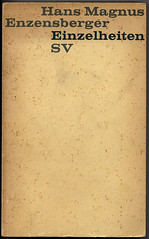While I was in Amsterdam in the winter of 2006-2007 I asked the people in a philosophy bookstore: “If Slavoj Žižek and Sloterdijk are my two favorite contemporary philosophers, who would the third be?” They came up with Hans Magnus Enzensberger and Alain Badiou.
I had remembered Badiou but had almost forgotten Enzensberger, but last weekend at the used book store De Slegte I bought a Dutch translation of Enzensberger’s Einzelheiten, and was very much taken by his analysis of the concept avant-garde in his essay The Aporias of the Avant-Garde.
Aporias, published in 1962 in Germany, is one of the first essays that preached the “death of the avant-garde” which has been celebrated since the advent of postmodernism. It features good analyses too of Lukacs petty defense of literary realism and stimulating reflections on the absurdity of some critics’ grouping of individual artists into art movements, especially in cases such as expressionist literature (no writer has ever called himself expressionist).
On a general level it provides excellent etymological and semantic analyses of the term avant-garde.
P.S. Published in the same year was another work on avant-garde practices, which I suspect is more an eulogy: The Theory of the Avant-garde by Renato Poggioli.


Thanks for the pointer to this “death of the avant-garde” piece. I’d not heard of it.
My dim recollection of the Poggioli book is that it is a critical survey, not a eulogy.
I have come to detest the notion of the avant-garde for all the reasons that the short precis you link to the piece provides. [See my post on “Blow Up” for example.]
When I hear the phrase avant-garde, I think of Lenin, and inevitably, Stalin. I am very fond of apocalyptic bombast as a style, but only as a style.
Lenin and Stalin are mentioned in the essay, as well as the Soviet Encyclopedia (that Sontag also mentions in her essay on Riefenstahl).
I have your same visceral anti-reaction to avant-garde as a term and minimal painting (art should be grand), but still think that Duchamp was the “greatest” 20thC artist.
Take away the antipathic stench that surrounds the word avant-garde, and you are still left with cutting-edge practices relevant to the current condition.
I think Duchamp would have been amused that you consider him a great artist! He was certainly a fascinating man. Personally, I think he produced some interesting art, did a lot of marvelous things, and produced ONE masterpiece, L’Etant Donnees, about which I have a post. That piece is simply magic!! As a piece of aesthetic and intellectual subvesion and summing up, it surpasses even WR – Mysteries of the Organism!
Mostly, when I think of avant-garde art, I think of boring art. Art with ONE idea behind it, and an intellectual, analytic one, without feeling. I guess you feel more or less the same.